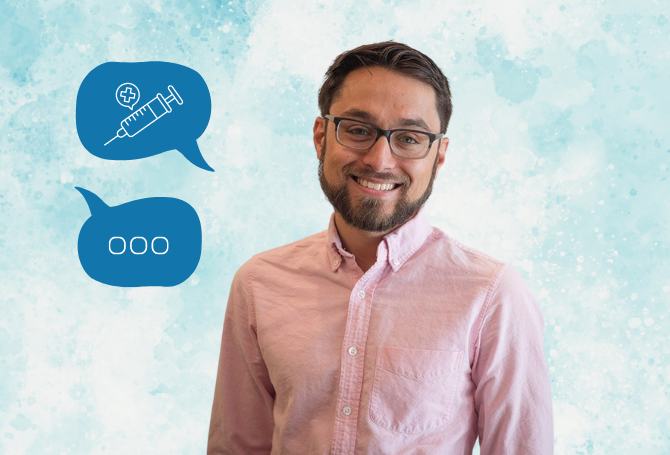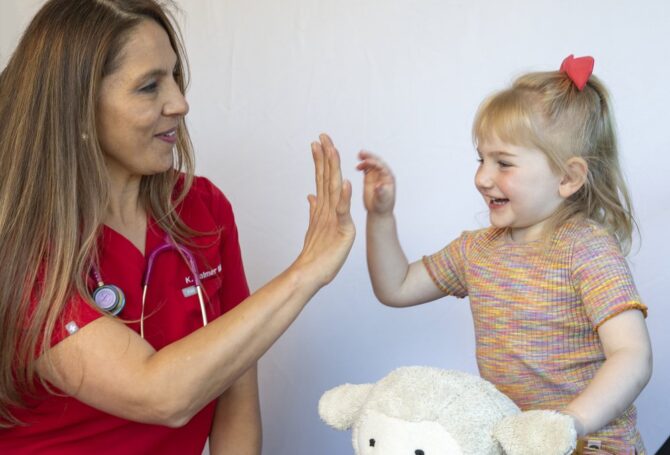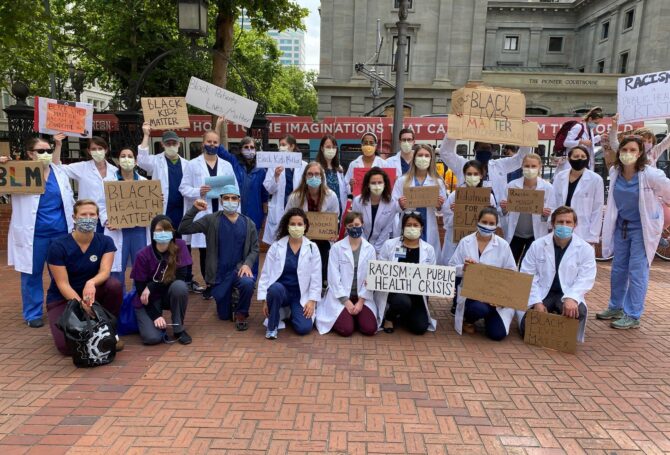
August 23, 2022
Ryan Hassan, MD, MPH, FAAP, traces his first vaccine advocacy actions back to Salt Lake City, UT, where he completed his medical residency in 2017. He wrote his first published op-ed piece on vaccines, and traveled to Capitol Hill to advocate for bills supporting vaccine rates. Today, educating fellow clinicians and families about vaccinations is a defining part of his career. Read on for more about how Dr. Hassan approaches conversations with families, his work with Boost Oregon, how he stays hopeful in the midst of disinformation.
A public health foundation
While in medical school, Dr. Hassan completed a master of public health program, which greatly shaped how he views medicine. “I think of patients and all the care I provide in the context of broader public heath,” he says. “That was the foundation for why I felt so drawn to vaccine advocacy and education.”
Of all the public health issues he cares about – from climate change to gun violence prevention – Dr. Hassan has focused his time most deeply on vaccinations.
“Unfortunately, we don’t always talk about other aspects of public health during each medical visit, but we definitely talk about vaccines,” Dr. Hassan said. “It’s a practical area of focus for a provider. I have to have these conversations anyway, and it makes my job more enjoyable to be able to do so effectively.”
Collaborations with Boost Oregon
After moving to Oregon, Dr. Hassan said he quickly learned about Boost Oregon, an organization focused on community-based vaccine education. At Boost, he volunteered to host educational workshops, and began collaborating with pediatricians Jay Rosenbloom, MD, Ph.D, and Joel Amundson, MD. In 2020, he became a member of Boost’s medical advisory board and joined the organization’s COVID task force. In January 2022, he began as Boost’s inaugural medical director.
As medical director, Dr. Hassan oversees Boost’s educational offerings for healthcare providers and families. His latest project has been to help develop curriculum to train 20 new Oregon medical providers how to deliver COVID-19 vaccine education to their own communities.
A strengths-based approach to vaccine conversations
Dr. Hassan says that a strengths-based, motivational interviewing approach has helped him have effective patient conversations about vaccines. He emphasizes that he doesn’t consider it his job to change people’s minds, but rather to be a guide, and to offer to help them sift through all the information they’ve already inevitably been finding on their own.
“[This approach] translates to all other aspects of care,” he says, “I’ve become less prescriptive in general, because I’ve been able to truly recognize that people know what they need to do to stay healthy. It’s about helping families remember things they like about themselves and the things they’re doing well, and where they think there is room for change. That’s an approach I’d use for any kind of conversation about health, whether it’s about vaccines or otherwise.”
Vaccine conversations take time
Many of Dr. Hassan’s victories are understated moments with families.
“You often don’t know how effective a conversation you’ve had is, because it’s rare someone will say, ‘I didn’t want to vaccinate, but you talked to me and now I want to vaccinate.’ A lot of times it’s much subtler, and it’s a gradual process over time,” he says.
When families share vaccine-related concerns, Dr. Hassan aims to follow with open-ended, non-judgmental questions to explore their hesitancy. He says that if the parents begin to ask him for his opinion, he knows the conversation has turned a corner and they’re likely open to hearing information from him. These conversations have spanned multiple visits or years, and they don’t always result in full vaccination. But Dr. Hassan leaves the door open.
He says because deciding whether or not to vaccinate can be a slow process for hesitant families, he starts the conversation early. For instance, he often beings talking to families about the HPV vaccine at age nine, and by the time kids are 11 or 12, the families will often decide they’re ready to vaccinate.
Staying hopeful
Even with his experience and training in vaccine education, Dr. Hassan says he can still face burnout. When he took a month for paternity leave last year, he said he realized how much he needed to spend time with his family and take space from challenging patient encounters and the weight of vaccine and health misinformation swirling around him.
“It’s hard to deal with. I think a lot about my daughter, the world she’s going to have to live in, and the unnecessary health complications that she’s going to be at risk for because of all the poor decisions being made around her.”
Dr. Hassan said he has to remind himself that he can only control his own decisions and how he approaches the world. He says the most effective way to keep himself, his patients, and his family healthy is to take care of himself, to prioritize things that he enjoys, to spend time with people he cares about, and to encourage his patients to do the same things.
In the midst of troubling data or discouraging media coverage, he asks his colleagues to remember how much each patient-provider conversation matters.
“Every time you ask a question, you open the door, you help a patient feel validated and heard – that is creating good in the community and improving the relationships patients have with us. Even if you’re not getting someone vaccinated that day. Just doing our jobs each day has a huge impact that we can’t always measure or see.”



